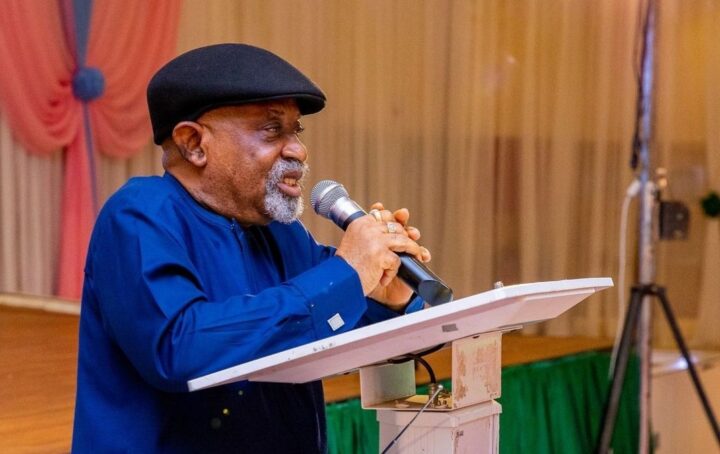Chris Ngige, minister of labour and employment, says there was some level of improvement recorded in negotiations with the Academic Staff Union of Universities (ASUU) before the strike was extended.
ASUU is currently on strike over failure of the government to meet its demands, including issues on funding of tertiary institutions and review of lecturers’ salaries and allowances.
Speaking on Monday at the presentation of a publication by the Nigeria Labour Congress (NLC) to mark its 40th anniversary, Ngige also explained why the government decided to take the matter to court.
The NLC publication is titled ‘Contemporary History of Working Class Struggles’, and it was unveiled in Abuja.
Advertisement
The minister said he would have failed in his duties if he did not refer the matter to the national industrial court, after months of discussions which failed.
He said ASUU was at the stage of collective bargaining (CBA) negotiation with their employers, the federal ministry of education, when they embarked on strike.
“We have to counsel our brothers on negotiation. No negotiation is forced. You cannot say it is either you give me 200 percent or I will continue my strike,” he said.
Advertisement
“There are laws guiding strike. There are ILO principles on right to strike. Nobody can take it away. Butthere are things that follow it when you embark on strike as a worker and they are enshrined in the laws of our land.
“It is written in Trade Dispute Act. The ILO principles of strike talk about the right of a worker to withdraw services. There is also right to picket. These are things that are done.
“Nigeria is respected in ILO. Some people said federal government took ASUU to court. No. I referred the matter after seven months of protracted discussions and negotiations that failed.
“Some people are saying 2009 agreement. The 2009 agreement has been renegotiated in 2013/2014 with the administration of former President Goodluck Jonathan. It is an anathema to use 2009 agreement.
Advertisement
“What is left is the renegotiation of their conditions of service, which is their right. It should be done but they are negotiating it under the principle of offer and acceptance, and it broke down irretrievably there at the federal ministry of education.
“That kick-started section 17 of the Trade Dispute Act, whereby the minister of labour and employment, whoever it is, if you don’t transmit according to the dictates of section 17, TDA, 2004, Laws of the Federation of Nigeria, this means you would have failed in your function. Therefore, I had to transmit.”
He, however, added it doesn’t mean there can’t be an out-of-court settlement.
“The pro-chancellors said they want to do counter offer. I told them to do it as quickly as possible. Those are ingredients of labour relations,” he added.
Advertisement
“It is not enough if you misinform your membership. That should be a disservice. We should read through things as it is and interpret same way. If I leave them in education, they will stay there two years.”
The minister also spoke on efforts by the government to review salaries of workers.
Advertisement
“Yes, the inflation has increased worldwide and it is not confined to Nigeria. That is why in many jurisdictions, it is an adjustment of wages right now,” he said.
“We, as the Nigerian government, shall adjust in confirmative with what is happening in wages.
Advertisement
“More importantly, the 2019 National Minimum Wage Act, right now, has a clause for the review, which we started then. I do not know whether it is due next year or 2024.
“But before then, the adjustment of wages will reflect what is happening in the economy, just as government has started the adjustment with the Academic Staff Union of Universities.”
Advertisement
The federal government had recently said it offered lecturers a 23.5 percent increase, while professors were offered 35 percent increase.
ASUU, however, was said to have rejected the offer.
Add a comment






